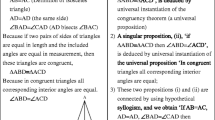Abstract
It is generally accepted that proof is central to mathematics. There is less agreement about how proof should be introduced at school level. We propose an approach—based on the systematic exploitation of structured calculation—which builds the notion of objective mathematical proof into the curriculum for all pupils from the earliest years. To underline the urgent need for such a change we analyse the current situation in England—including explicit evidence of the extent to which current instruction fails even the best students.
Kurzreferat
Es ist allgemein akzeptiert, dass Beweisen ein zentrales Thema der Mathematik ist. Weniger klar ist, wie dieses Thema im Rahmen des Unterrichts in der Schule behandelt werden sollte. In diesem Beitrag wird ein Weg vorgeschlagen, der auf der systematischen Nutzung eines strukturierten Kalküls basiert. Damit ist die Idee des mathematischen Beweises im Unterricht bereits zu einem sehr frühen Zeitpunkt in den Unterricht zu integrieren. Um die Bedeutung des Themas für den Unterricht zu belegen, wird die derzeitige Situation an Schulen in England betrachtet, die als wenig hilfreich selbst für manche gute Schülerinnen und Schüler angesehen wird.
Similar content being viewed by others
References
Barnard, T. (1999). A pocket map of algebraic manipulation—Leicester, UK: The Mathematical Association.
Barnard, T. (2002) Reducing mathematics to human size. Research in mathematics education Vol. 4, p. 115–126.
Cuoco, A. (2003). Teaching mathematics in the United States. Notices of the American Mathematical Society Vol. 50, p. 777–787.
Freudenthal, H. (1973). Mathematics as an educational task—Dordrecht, Holland: Reidel.
Freudenthal, H. (1983). Didactical phenomenology of mathematical structures—Dordrecht, Holland: Reidel.
Gardiner, A. (1997). More mathematical challenges.—Cambridge, UK: Cambridge University Press.
Gardiner, A. (1999a). Mathematical puzzling.—Mineola, New York: Dover.
Gardiner, A. (2003a). What does English school mathematics achieve at present?—Birmingham: Birmingham University, School of Mathematics
Gardiner, A. (2003b). What does English university mathematics achieve at present?—Birmingham: Birmingham University, School of Mathematics
Gardiner, T. (1995). Wrong way. Go back!—In: Mathematical Gazette Vol. 79, p. 335–346.
Gardiner, T. (1998). The art of knowing—In: Mathematical Gazette Vol. 82, p. 354–372.
Gardiner, T. & Moreira, C. (1999b). Proof matters.—In: Mathematics teaching Vol. 169, p. 17–21.
Hanna, G. & Jahnke, H.N. (1996). Proof and proving—In: A. Bishop, K. Clements, C. Keitel, J. Kilpatrick, C. Laborde (Eds.), International handbook of mathematical education. Dordrecht, Holland: Kluwer, p. 877–908.
Hebborn, J. (1997). Decision mathematics 1.—Oxford, Heinemann.
Hebborn, J. (2000). Decision mathematics 1 (revised edition).— Oxford, Heinemann.
HMSO (1982). Mathematics counts.—London: Her Majesty's Staionery Office.
Hoyles, C. (1998). A culture of proving in school mathematics? —In: J.D. tinsley & D.C. Johnson (Eds.), Information and communications technology in school mathematics. London, Chapman & Hall.
LMS (1995). Tackling the mathematics problem. London: London Mathematical Society.
NC (2000). http://www.nc.uk.net/index.html
NCTM (1989). Curriculum and evaluation standards for school mathematics.—Reston, VA: National Council of Teachers of Mathematics.
NCTM (1991). Discrete mathematics across the curriculum, K-12. Reston, VA: National Council of Teachers of Mathematics.
Author information
Authors and Affiliations
Rights and permissions
About this article
Cite this article
Gardiner, T. Learning to prove: using structured templates for multi-step calculations as an introduction to local deduction. Zentralblatt für Didaktik der Mathematik 36, 67–76 (2004). https://doi.org/10.1007/BF02655761
Issue Date:
DOI: https://doi.org/10.1007/BF02655761




